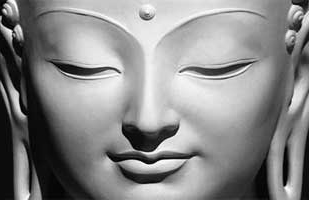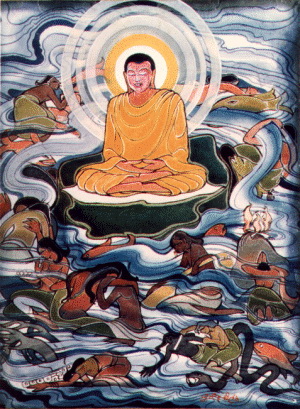
Chapter II - APPAMADA VAGGA - Heedfulness

THE ENERGETIC PROSPER
Utthanavato satimato sucikammassa nisamma karino
Sannatassa ca dhamma jivino appamattasa yaso'bhivaddhati.
Whosoever is energetic, mindful, pure in conduct, discriminating, self-restrained, right-living, vigilant, his fame steadily increases.
II:02 The voice of a rich man (Kumbha Ghosaka)
At one time, a plague broke out in the city of Rajagaha. A city banker, his wife and other members of his household also succumbed to the disease. When they were both down with the disease the couple told their young son, Kumbha Ghosaka, to leave them and flee from the house and to return only after the plague had subsided. They also told him that they had some valuable treasure buried at a certain place. The son did as he was told and stayed away from the city. Finally, after a long absence, he decided to return to the city.
By that time, nobody in the city could recognise him. He went to the place where his parents had said the treasure was hidden and found it intact. But he realised that if he were to unearth the buried treasure, people might think a poor young man had become wealthy by wrongful means and that he might be reported to the king. In that case, his property would be confiscated. So, he decided not to unearth the treasure and went to look for work to support himself. He was given the job of waking up and rousing the people early in the morning and of going round announcing that it was time to prepare food, time to fetch carts, yoke the bullocks and similar chores. He was a kind of town-crier whose services were necessary in the absence of clocks and alarms.
One morning, King Bimbisara heard him. The king who was very good at judging character by listening to voices commented, 'This is the voice of a man of great wealth.' A female attendant hearing the king's remark, sent someone to investigate. She reported that the youth was only a hireling of the labourers. In spite of this report the king repeated the same remark on two subsequent days. Again, enquiries were made but with the same result. The attendant thought that this was very strange, so she requested the king's permission to go and investigate the matter personally.
Disguised as peasants the attendant and her daughter set out for the homes of the labourers. Saying that they were travellers, they asked for shelter and were given accommodation in his house. They managed to prolong their stay there. During the period, the king proclaimed twice that a certain ceremony must be performed in the locality where the labourers lived, and that every household must make contributions. Kumbha Ghosaka had no ready cash for such an occasion. So, he was forced to get some gold coins from his treasure. As these coins were handed over, the attendant substituted them with her own money and sent the coins to the king. After some time, she sent a message to the king asking him to send some men and summon the young man to the court. Kumbha Ghosaka very reluctantly went along with the men. The attendant and her daughter also went to the palace, ahead of him.
At the palace, the king told him to tell the truth and gave him due assurance that he would not be harmed if he were innocent. He then admitted that those gold coins were his and also that he was the son of the city banker of Rajagaha, who had died in the plague years ago. He further revealed the place where the treasure was hidden. Subsequently, all the buried treasure was brought to the palace. The king appointed him to his father's position as a city banker and gave him one of his daughters in marriage.
Afterwards, taking Kumbha Ghosaka along with him, the king went to pay homage to the Buddha at the Veluvana monastery and told him how the youth, though rich, had earned his living as a servant of the labourers, and how he had appointed the youth as a banker because he was impressed by the young man's willingness to do even the most menial of jobs. When he was introduced to the Buddha, the Blessed One described the characteristics of those who can be prosperous.
Notes:
An island situated on a higher level cannot be flooded although the surrounding low lying land may be inundated. Such an island becomes a refuge to all. In the same way the wise man who develops insight should make an island of himself by attaining Arahanthood so that he may not be drowned by the four floods of sense-desires (kama), false beliefs (ditthi), craving for existence (bhava) and ignorance (avijja).
* We must understand that Cula Panthaka did not attain Arahanthood in a short period. He had prepared himself over many life times. The Buddha helped him to remove his residual impurities and finally release his mind from the defilements created by ignorance.

Editor for Buddha brothers: Matthew Laird Acred
If you should encounter any bugs broken links, or display errors just email us.
Buddha brothers has been running since Aug 2010 and can continue to run with your kind help!
If you love our website please donate so we can make this site even better !!